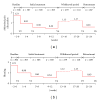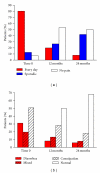Benefits from long-term treatment in irritable bowel syndrome
- PMID: 22272195
- PMCID: PMC3261481
- DOI: 10.1155/2012/936960
Benefits from long-term treatment in irritable bowel syndrome
Abstract
It is known that irritable bowel syndrome (IBS) is a chronic disease of cyclic nature characterized by recurrent symptoms. IBS patients should receive, as initial therapeutic approach a short course of treatment which, if effective, has the additional value of confirming the diagnosis. Long-term treatment should be reserved to diagnosed IBS patients with recurrent symptoms. Clinical trials with stabilized therapies and new active treatments showed an improvement of the symptoms over placebo that is often time-dependent but with high relapse rates (around 40%-50% when stopping treatment). Relapse is not always immediate after stopping treatment and the recent data from OBIS trial with otilonium bromide or with psychotherapy, showed that due to different chemico-physical characteristics of the drugs or the psychosomatic impact to the disease not all treatment gave the same relapsing rate if compared to placebo. Results of IBS clinical trials with different therapies tailored to the patient needs indicate that a cyclic treatment therapy is advisable to counteract the nature of the disease.
Figures






References
-
- Agréus L, Svärdsudd K, Talley NJ, Jones MP, Tibblin G. Natural history of gastroesophageal reflux disease and functional abdominal disorders: a population-based study. The American Journal of Gastroenterology. 2001;96(10):2905–2914. - PubMed
-
- Halder SLS, Locke GR, III, Schleck CD, Zinsmeister AR, Melton LJ, III, Talley NJ. Natural history of functional gastrointestinal disorders: a 12-year longitudinal population-based study. Gastroenterology. 2007;133(3):799–807. - PubMed
-
- Hahn B, Watson M, Yan S, Gunput D, Heuijerjans J. Irritable bowel syndrome symptom patterns: frequency, duration, and severity. Digestive Diseases and Sciences. 1998;43(12):2715–2718. - PubMed
-
- Hungin APS, Whorwell PJ, Tack J, Mearin F. The prevalence, patterns and impact of irritable bowel syndrome: an international survey of 40,000 subjects. Alimentary Pharmacology & Therapeutics. 2003;17(5):643–650. - PubMed
-
- Ford AC, Forman D, Bailey AG, Axon ATR, Moayyedi P. Fluctuation of gastrointestinal symptoms in the community: a 10-year longitudinal follow-up study. Alimentary Pharmacology & Therapeutics. 2008;28(8):1013–1020. - PubMed
LinkOut - more resources
Full Text Sources

